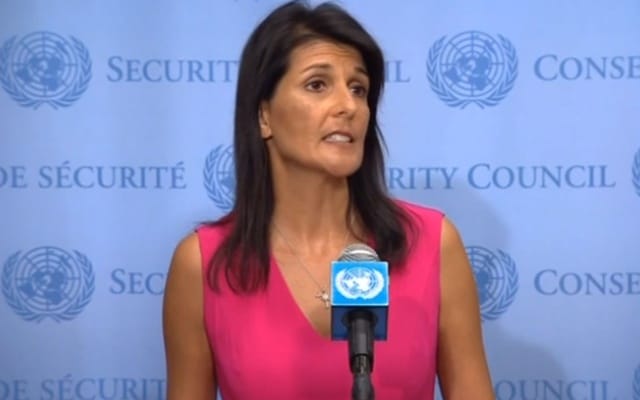Iran’s concern is rising over a US call on the International Atomic Energy Agency to request access to Iranian military sites as part of the monitoring of the July 2015 nuclear agreement.
At a Friday news conference in New York, US Ambassador to the UN Nikki Haley (pictured) said, “We are encouraging the IAEA to use all the authorities they have and to pursue every angle possible with the JCPOA [Joint Comprehensive Plan of Action], and we will continue to support the IAEA in that process.”
The IAEA has repeatedly said Iran is in compliance with the terms of the deal with the 5+1 Powers (US, UK, France, Germany, China, and Russia), under which Tehran agreed to cease production of 20% enriched uranium and give up all stocks in return for the lifting of US-led sanctions.
The Trump Administration has twice signed waivers of sanctions legislation, effectively accepting the finding of compliance. However, Donald Trump and his advisors have said that they want to step up pressure on the Islamic Republic. Many US restrictions have remained in place, and Congress passed additional sanctions last month over Iran’s testing of ballistic missiles, alleged support of terrorism, and human rights record.
Haley declared yesterday, “I have good confidence in the IAEA, but they are dealing with a country that has a clear history of lying and pursuing covert nuclear programs,”
During the negotiations for the July 2015 deal, some US officials and purported analysts put out claims that Iran had tested the potential for military use of enriched uranium. However, many of the claims were spurious — one analyst said the case was proved because of Iran’s purchase of industrial magnets and the appearance of a pink tarpaulin at the Parchin site — and none were proven before the completion of the agreement.
Earlier this week Haley met IAEA Director General Yukiya Amano in Vienna to set out the US position, but she went further in her Friday remarks with the accusation of past covert nuclear development.
On Wednesday, Iranian Foreign Minister Mohammad Javad Zarif said:
Regrettably, the international community views this visit and its stated purpose of “pressing the Agency” as an overt and aggressive attempt by a permanent member of the Security Council — which is openly hostile toward the JCPOA and determined to undermine and destroy it — to put pressure on the Agency.
Zarif said the US pressure will “undermine the independence and the credibility of the Agency’s work.”
On Thursday, Iran’s Permanent Mission to the IAEA also warned in a statement against any “illegal” pressure on the UN nuclear agency.

